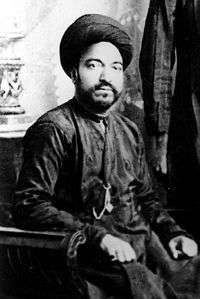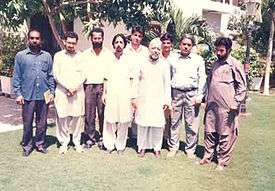Syed Sibte Hasan Naqvi
Maulana Syed Sibte Hasan Naqvi (مولانا سيد سبت حسن نقوى) (d. 1935) was a Shia cleric from Lucknow, Uttar Pradesh, India.[1] He was known by the title of Khatib-E-Azam (Great Orator).[2]

Family background

His last name "Naqvi" indicates he is one of the direct descendants of the Islamic prophet Muhammad through the lineage of the Imam Ali al-Naqi, he belonged to Nasirabadi sub-branch of Naqvis of Darul Ijtihad Jais and Nasirabad. Waris Hasan comes from Khandan-e-Ijtihad a notable family of Shia Muslim clerics of erstwhile Oudh State whose Ayatollah Syed Dildar Ali Naseerabadi Ghufran-Ma'ab Naseerabadi was Sibte's ancestor.
Syed Sibte Hasan Naqvi had a son named Syed Mohammad Waris Hasan Naqvi.[1] Waris Hasan too was a Shia cleric and held position of Principals of institutions like Shia College, Lucknow and Madrasatul Waizeen, Lucknow.[3]
Studies
He trained several Ulama such as Syed Sibte Hasan Naqvi, Farman Ali, Mohammad Haroon, Mohammad Dawood, Kifayat Hussain, Adeel Akhtar, and Jaffer Hussain. He did Mumtazul Afazil from Jamia Nazmia where Ayatullah 'Najm al-Ḥasan Namjmul Millat was his teacher. Sibte Hasan was also the teacher of Maulana Ibne Hasan Nonaharvi.
Public life
He was most famous for refining the style of Muharram majlis to the format used today, most notably in the Urdu language. Before his time, majalises in Lucknow and other places contained marsiya, recited by great poets like Mir Anees and Mirza Dabeer. The new format has Khutba in Arabic, some tafseer, fazail of Ahlul Bayt and then masaeb of Karbala.[2]
He has composed nauhey under pen-name Fatir Jaisi, the collection has been published as 'Hamd e Rabbul Arbaab'[4] and Nauhe[5] by Noore Hidayat Foundation, Lucknow.[6]
He was one of the leading advocates of the Shia College campaign.[2]
He created a waqf Shamsul Ulema Maulana Syed Sibte Hasan Naqvi on 10 April 1933, of which Waris Hasan his son became mutwalli (caretaker).[7]
References
- Rizvi, Syed Saeed Akhter. "Indian Ulema List (Source- Khursheed Khawar:Tazkratul ulamae hind o pak)". islamic-laws.com. Ma'arif Publications. Archived from the original on 3 January 2019. Retrieved 17 August 2014.
- Jones, Justin (24 October 2011). Shi'a Islam in Colonial India: Religion, Community and Sectarianism. Cambridge University Press. ISBN 978-1-139-50123-1.
- Among the Shiites
- "University of Lucknow | Arts - Academia.edu". lkouniv.academia.edu. Retrieved 17 April 2020.
- Encyclopedia, IndianShia. "NAUHE BY KHATIB E AZAM ALLAMA SYED SIBTE HASAN FATIR JAISI PUBLISHED BY NOORE HIDAYAT FOUNDATION LUCKNOW.PDF" (PDF). Cite journal requires
|journal=(help) - "NAUHE BY KHATIB E AZAM ALLAMA SYED SIBTE HASAN FATIR JAISI PUBLISHED BY NOORE HIDAYAT FOUNDATION LUCKNOW.PDF". Google Docs. Retrieved 17 April 2020.
- Shia Central Board Of Waqfs And ... vs Syed Alam on 4 April 2002, Allahabad High Court, Author: N Mehrotra, Bench: N Mehrotra
External links
- "Khateeb e azam allama syed sibte hasan fatir jaisi ki zakiri ke chand nukte". Issuu (in Urdu). Retrieved 17 April 2020., Published on Nov 6, 2016 by Noor-e-Hidayat Foundation, Lucknow, India.
- Encyclopedia, Indian Shia. "Qasida Dar madha Hazrat Fatima Zahra (s.a) By Kalime Ahlebait Khatib e Azam Allama Sibte Hasan Naqavi Fatir Jaisi By NHF.PDF" (PDF) (in Urdu). Cite journal requires
|journal=(help)